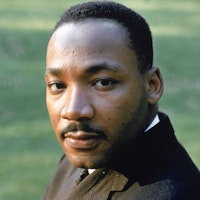Only Light
Topic: Truth, Law, & Principle
I say to you today that I still stand by nonviolence… And the other thing is that I am concerned about a better world. I’m concerned about justice. I’m concerned about brotherhood. I’m concerned about truth. And when one is concerned about these, he can never advocate violence. For through violence you may murder a murderer but you can’t murder murder. Through violence you may murder a liar but you can’t establish truth. Through violence you may murder a hater, but you can’t murder hate. Darkness cannot put out darkness. Only light can do that.
Martin Luther King Jr. was born on January 15, 1929, in Atlanta, Georgia, as Michael Luther King Jr., but later changed his name to Martin. He came from a family of pastors, with his grandfather and father both serving as pastors at the Ebenezer Baptist Church. Martin Luther King Jr. attended segregated public schools and graduated from high school at the age of fifteen. He went on to earn his B.A. degree in 1948 from Morehouse College, where his father and grandfather had also graduated.
After completing three years of theological study at Crozer Theological Seminary, where he was elected president of a predominantly white senior class, King received his B.D. degree in 1951. He then pursued graduate studies at Boston University, where he met and married Coretta Scott. King completed his doctorate in 1955 and had two sons and two daughters with Coretta. Throughout his life, Martin Luther King Jr. played a crucial role in the civil rights movement, advocating for racial equality and justice through nonviolent means. His leadership and inspiring speeches, such as his famous "I Have a Dream" speech, made him a prominent figure in the fight against segregation and discrimination. In 1964, he was awarded the Nobel Peace Prize for his efforts to promote peaceful change and equality for African Americans. Tragically, Martin Luther King Jr. was assassinated on April 4, 1968, but his legacy as a champion of civil rights continues to inspire people around the world.
Where Do We Go From Here: Chaos or Community?
Wilson, Andrew, editor. World Scripture II. Universal Peace Federation, 2011, p. 1088 [Martin Luther King, Jr., Where Do We Go From Here: Chaos Or Community? Address to the Southern Christian Leadership Conference (16 August 1967)].

Martin Luther King Jr.
Theme: The Light of Truth


About This Martin Luther King, Jr Quotation [Commentary]
In Martin Luther King, Jr.’s teachings, the metaphor of light conquering darkness symbolizes the belief that love and nonviolence are the only true means to overcome injustice and hatred. King’s statement, “Darkness cannot put out darkness. Only light can do that,” embodies his conviction that societal evils cannot be addressed with hate or violence but with understanding and compassion. This principle, at its core, is a universal truth about the nature of human relationships and the power of nonviolence to foster justice and brotherhood, challenging us to confront conflict with love rather than aggression.
King’s emphasis on nonviolence, justice, and truth underlines his view that the fight for equality is intertwined with moral integrity. Rejecting violence, he argues for achieving justice through actions that embody the very values we seek to promote. This stance is not merely ideological but a practical approach to social change, advocating for a transformation rooted in moral conviction and an appeal to shared humanity. It represents a call to action, demanding courage and resilience, and faith in the transformative power of love over hatred.
Reflecting on King’s broader teachings, his vision transcends the civil rights movement to articulate a universal principle of human coexistence and societal advancement. The light of truth he speaks of is not only a strategy but a guiding principle for human behavior, advocating for a world where justice is achieved through understanding and respect. King’s legacy teaches us that the path to a better society is illuminated by the light of truth, urging us to see beyond immediate conflicts to a future where every person is recognized and valued.
Additional Martin Luther King, Jr. Quotes
Resources
Related Quotes
Copyright © 2017 – 2026 LuminaryQuotes.com About Us